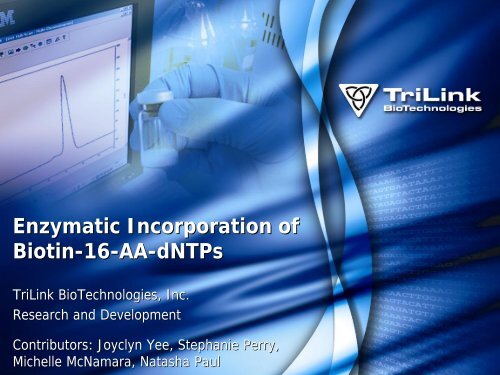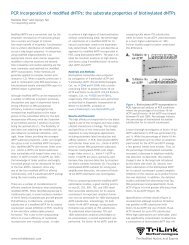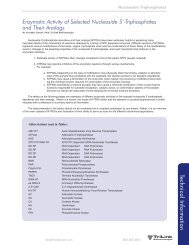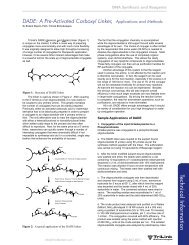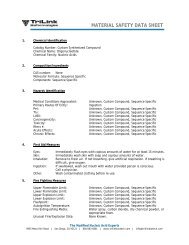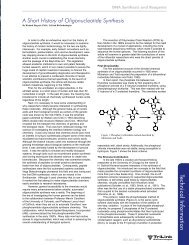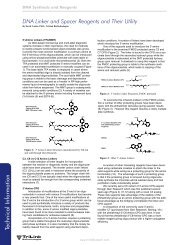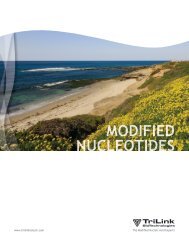Enzymatic Incorporation of Biotin-16-AA-dNTPs - TriLink ...
Enzymatic Incorporation of Biotin-16-AA-dNTPs - TriLink ...
Enzymatic Incorporation of Biotin-16-AA-dNTPs - TriLink ...
You also want an ePaper? Increase the reach of your titles
YUMPU automatically turns print PDFs into web optimized ePapers that Google loves.
<strong>Enzymatic</strong> <strong>Incorporation</strong> <strong>of</strong><br />
<strong>Biotin</strong>-<strong>16</strong><br />
<strong>16</strong>-<strong>AA</strong>-<strong>dNTPs</strong><br />
<strong>TriLink</strong> BioTechnologies, Inc.<br />
Research and Development<br />
Contributors: Joyclyn Yee, Stephanie Perry,<br />
Michelle McNamara, Natasha Paul
Overview<br />
<strong>Biotin</strong> is a naturally occurring c<strong>of</strong>actor that binds very tightly to the<br />
tetrameric protein, avidin. This strong association between biotin and<br />
avidin has been used in a number <strong>of</strong> biotechnology applications, which<br />
include detection and isolation <strong>of</strong> a molecule <strong>of</strong> interest. One approach<br />
for introducing biotin modifications into DNA is by the enzymatic<br />
incorporation <strong>of</strong> nucleoside 5′-triphosphates that have been chemically<br />
modified with biotin.
Outline<br />
•Goal: Evaluate the enzymatic incorporation <strong>of</strong> <strong>Biotin</strong>-<strong>16</strong>-<strong>AA</strong>-<strong>dNTPs</strong>.<br />
•Approach:<br />
•Evaluate <strong>Biotin</strong>-<strong>16</strong>-<strong>AA</strong>-dNTP incorporation in primer extension<br />
experiments using either MMLV reverse transcriptase or<br />
Klenow(exo-) DNA polymerase.<br />
•Evaluate the incorporation <strong>of</strong> <strong>Biotin</strong>-<strong>16</strong>-<strong>AA</strong>-<strong>dNTPs</strong> in PCR.
Chemical Structures <strong>of</strong> the <strong>Biotin</strong>-<strong>16</strong>-<strong>AA</strong>-<strong>dNTPs</strong><br />
N<br />
H<br />
HN<br />
O<br />
O<br />
HO<br />
N<br />
NH<br />
O<br />
O<br />
N<br />
H<br />
O<br />
N<br />
H<br />
O<br />
N<br />
H<br />
O<br />
S<br />
O<br />
P<br />
O<br />
O<br />
P<br />
O<br />
O<br />
P<br />
O<br />
O<br />
O<br />
O<br />
O<br />
N<br />
H<br />
HN<br />
O<br />
O<br />
HO<br />
N<br />
N<br />
NH 2<br />
O<br />
N<br />
H<br />
O<br />
N<br />
H<br />
O<br />
N<br />
H<br />
O<br />
S<br />
O<br />
P<br />
O<br />
O<br />
P<br />
O<br />
O<br />
P<br />
O<br />
O<br />
O<br />
O<br />
O<br />
<strong>Biotin</strong>-aminoallyl-2'-deoxyuridine-<br />
5'-triphosphate<br />
<strong>Biotin</strong>-aminoallyl-2'-deoxycytidine-<br />
5'-triphosphate
Single Nucleotide <strong>Incorporation</strong> <strong>of</strong> <strong>Biotin</strong>-<strong>16</strong>-<strong>AA</strong><strong>dNTPs</strong><br />
by MMLV Reverse Transcriptase<br />
Experimental Conditions: 1x First strand synthesis buffer (50 mM Tris-HCl (pH 8.3 @ 25 o C), 50 mM KCl, 3.0 mM MgCl 2 , 5 mM<br />
DTT), 5’-FAM-labeled primer (6.25 μM), RNA template (10 μM), Ambion MMLV Reverse transcriptase (0.2 U/μL), 0.1 mM<br />
dNTP. Thermal cycling parameters: 42 o C @ 20 min; 98 o C @ 2 min.<br />
dATP + +<br />
dCTP + +<br />
dGTP + +<br />
dTTP + +<br />
<strong>Biotin</strong>-<strong>16</strong>-<strong>AA</strong>-dCTP +<br />
<strong>Biotin</strong>-<strong>16</strong>-<strong>AA</strong>-dUTP +<br />
N+1 extension product<br />
Primer<br />
= DNA<br />
= RNA<br />
5′-FAM<br />
3′ AUCG<br />
5′-FAM<br />
3′ GUCA<br />
All biotinylated <strong>dNTPs</strong> are substrates for MMLV reverse transcriptase and<br />
produce an extension product with lower mobility.
Single Nucleotide <strong>Incorporation</strong> <strong>of</strong> <strong>Biotin</strong>-<strong>16</strong>-<strong>AA</strong><strong>dNTPs</strong><br />
by Klenow(exo-) DNA Polymerase<br />
dATP + +<br />
dCTP + +<br />
dGTP + +<br />
dTTP + +<br />
<strong>Biotin</strong>-<strong>16</strong>-<strong>AA</strong>-dCTP +<br />
<strong>Biotin</strong>-<strong>16</strong>-<strong>AA</strong>-dUTP +<br />
N+1 extension product<br />
Primer<br />
= DNA<br />
= RNA<br />
5′-FAM<br />
3′ ATCG<br />
5′-FAM<br />
3′ GTCA<br />
All biotinylated <strong>dNTPs</strong> are substrates for Klenow(exo-) DNA polymerase and<br />
produce an extension product with lower mobility.<br />
Experimental Conditions: 1X NEBuffer 2 (10 mM Tris-HCl (pH 7.9 @ 25°C), 50 mM NaCl, 10 mM MgCl 2 , 1 mM DTT), 5’-FAMlabeled<br />
primer (10 μM), DNA template (17 μM), New England Biolabs Klenow(exo-) DNA polymerase (0.025 U/μL), 20 μM<br />
dNTP. Thermal cycling parameters: 37 o C @ 20 min; 72 o C @ 20 min.
Summary <strong>of</strong> biotin-<strong>16</strong>-<strong>AA</strong>-dNTP Single<br />
Nucleotide <strong>Incorporation</strong> Studies<br />
Relative incorporation <strong>of</strong><br />
the modified nucleotide<br />
1<br />
0.8<br />
0.6<br />
0.4<br />
0.2<br />
0<br />
<strong>Biotin</strong>-<strong>16</strong>-<strong>AA</strong>-dUTP<br />
<strong>Biotin</strong>-<strong>16</strong>-<strong>AA</strong>-dCTP<br />
MMLV RT<br />
Klenow(exo-)<br />
Relative modified<br />
nucleotide incorporation<br />
=<br />
% n+1 extension product (modified dNTP)<br />
% n+1 extension product (natural dNTP)<br />
Relative to their natural counterpart, biotinylated dCTP and dUTP analogs are<br />
incorporated with ~50% lower efficiency at the conditions examined.
<strong>Incorporation</strong> <strong>of</strong> <strong>Biotin</strong>ylated <strong>dNTPs</strong> by Taq DNA<br />
Polymerase in PCR<br />
% <strong>Biotin</strong>-<strong>16</strong>-<br />
<strong>AA</strong>-dCTP*<br />
100%<br />
97.1%<br />
96.8%<br />
96.2%<br />
95.6%<br />
94.7%<br />
93.3%<br />
90.9%<br />
85.7%<br />
0%<br />
% <strong>Biotin</strong>-<strong>16</strong>-<br />
<strong>AA</strong>-dUTP*<br />
100%<br />
88.9%<br />
87.5%<br />
85.7%<br />
83.3%<br />
80%<br />
75%<br />
66.6%<br />
50%<br />
0%<br />
*Total concentration <strong>of</strong> biotinylated + natural dNTP was maintained at 0.2 mM. The percentage <strong>of</strong><br />
biotinylated dNTP was titrated between 0 and 100%.<br />
All biotinylated <strong>dNTPs</strong> are substrates for Taq DNA polymerase in PCR.<br />
As the percentage <strong>of</strong> biotinylated nucleotide increases, a corresponding<br />
decrease in the mobility <strong>of</strong> the amplicon is observed.<br />
100% biotinylated dNTP substitution causes complete reaction inhibition.<br />
Experimental Conditions: Control Lambda primers (0.2 mM), New England Biolabs Taq DNA Polymerase (1 U/50 mL rxn), 0.2<br />
mM <strong>dNTPs</strong> (including <strong>Biotin</strong> and natural), 1x NEB buffer (10 mM Tris-HCl (pH 8.3 @ 25 o C), 50 mM KCl, 1.5 mM MgCl 2 , Lambda<br />
genomic DNA (1 ng/50 μL rxn).<br />
Primer sequences: 5’-CCTGCTTCTGCCGCTTCACGA and 5’-TCCGGAT<strong>AA</strong><strong>AA</strong>ACGTCGATGACATTTGC.<br />
Thermal cycling parameters: 95 o C @ 2 min; [95 o C @ 15 sec, 55 o C @ 15 sec, 72 o C @ 45 sec]25x; 72 o C @ 5 min.
<strong>Incorporation</strong> <strong>of</strong> <strong>Biotin</strong>ylated <strong>dNTPs</strong> by Taq DNA<br />
Polymerase in PCR<br />
<strong>Biotin</strong>-<strong>16</strong>-<strong>AA</strong>-dCTP<br />
<strong>Biotin</strong>-<strong>16</strong>-<strong>AA</strong>-dUTP<br />
120<br />
120<br />
% Product Formation<br />
100<br />
80<br />
60<br />
40<br />
20<br />
0<br />
0 85.7 90.9 93.3 94.7 95.6 96.2 96.8 97.1 100<br />
Percent <strong>Biotin</strong> dCTP<br />
% Product Formation<br />
100<br />
80<br />
60<br />
40<br />
20<br />
0<br />
0 50 66.6 75 80 83.3 85.7 87.5 88.8 100<br />
Percent <strong>Biotin</strong> dUTP<br />
The percent product formation is the product yield, normalized to the yield with<br />
100% unmodified <strong>dNTPs</strong>.<br />
Extent <strong>of</strong> biotinylated dNTP substitution that yields ~50% PCR product formation:<br />
<strong>Biotin</strong> dCTP = ~92%<br />
<strong>Biotin</strong> dUTP = ~75%
Summary<br />
• <strong>Biotin</strong>-<strong>16</strong>-<strong>AA</strong>-dCTP and biotin-<strong>16</strong>-<strong>AA</strong>-dUTP can be readily<br />
incorporated by reverse transcriptases and DNA polymerases in<br />
primer extension schemes.<br />
• <strong>Biotin</strong>ylated nucleotides are readily incorporated during PCR<br />
amplification schemes.<br />
• <strong>Biotin</strong>-<strong>16</strong>-<strong>AA</strong>-dCTP can be substituted to a greater extent for its<br />
natural dNTP in PCR without compromising amplicon yield.


